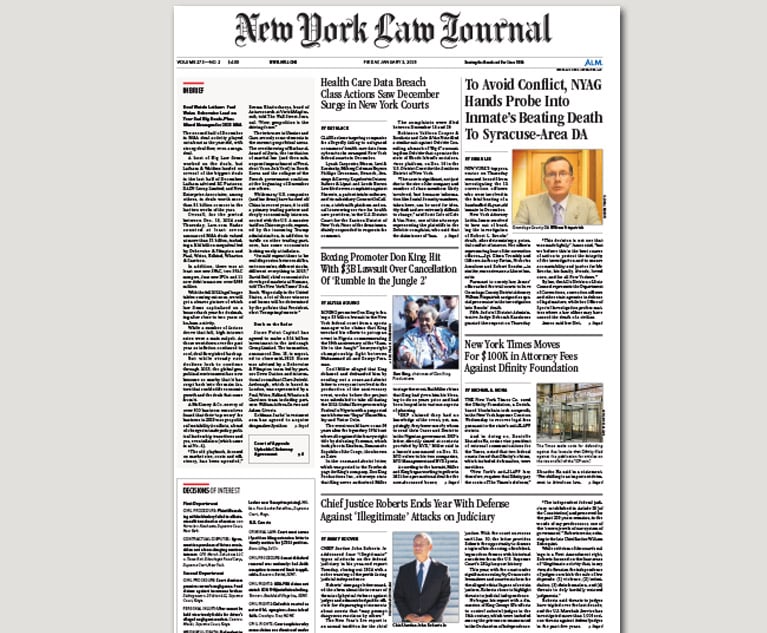 Photo: igorstevanovic/Shutterstock.com
Photo: igorstevanovic/Shutterstock.com Fabricating Brief, Lying to Partner Gets Attorney Suspended
The appeals panel's opinion laid out a series of lies and fabrications—stipulated to by both the lawyer and the grievance committee—that painted a portrait of mounting falsehoods.
February 11, 2019 at 06:43 PM
5 minute read
A Manhattan real estate attorney and former law firm associate has been suspended from practicing law after fabricating an opposition brief in the midst of appellate litigation, constructing a fake chain of emails supposedly exchanged with opposing counsel, and telling a series of other work-related lies to the partner with whom he was working.
Dennis McCoobery, admitted to the state bar in 1998, has been suspended for three months by an Appellate Division, First Department panel that considered several mitigating factors—including that McCoobery had no prior disciplinary history and that his father had been diagnosed with terminal illness and later passed away—while arriving at a suspension-punishment that had been put before it by joint motion of the Attorney Grievance Committee and McCoobery.
The unanimous panel's opinion issued this month laid out a series of lies and fabrications—stipulated to by both McCoobery and the grievance committee—that mounted over a period of weeks and months.
McCoobery, who left his former boutique firm Stempel Bennett Claman & Hochberg in May 2017, did not return calls seeking comment made to multiple phone numbers.
The opinion, citing the stipulated facts, detailed lies told by McCoobery that spooled out from late 2016 into 2017 and involved two different real estate litigations in which the firm was apparently representing different clients.
In the more extended string of deceits, the Stempel Bennett partner—who was not named by the panel—and McCoobery were representing a real estate-matter plaintiff.
In November 2016, an appeals brief drafted by the partner was due to be filed in the Appellate Division, First Department.
McCoobery was told to send the brief and appeal record to a printing vendor and instruct the vendor to serve and file the documents. While he sent the documents to the printer, he never told the vendor to serve and file them, the panel wrote.
Then McCoobery, who had been working at Stempel Bennett since 2008, lied and told the partner he'd instructed the vendor to file and serve the documents.
Next, in December 2016, he lied again and told the partner that there'd been a stipulation between himself and opposing counsel permitting an extension to January 2017 for the brief's filing, the panel said.
As he continued to try cover up his deceits, McCoobery then fabricated an appellate opposition brief and gave to the partner a copy of the fabricated brief that was never served, and he constructed a false chain of emails to make it appear as if he'd received the fabricated brief from opposing counsel, the panel also explained, citing the stipulated facts.
In turn, the partner drafted a reply brief, which McCoobery falsely told the partner was due Feb. 10, 2017. The partner forwarded the brief to the client for review.
McCoobery further lied and told the partner the client's appeal was calendared for the First Department's June 2017 term. On May 1, 2017, after noticing the appeal hadn't been calendered, the partner told McCoobery he was going to call opposing counsel to find out why it hadn't been calendared.
McCoobery then admitted his deceptions, and on May 2, 2017, he left the firm, the panel said.
In the other litigation, the panel—composed of Justices David Friedman, Judith Gische, Jeffrey Oing, Anil Singh and Peter Moulton—wrote that McCoobery had been tasked by the partner with drafting a client's appellate opposition brief to be submitted to the First Department in a real estate litigation.
Around February 2017, McCoobery filed the brief without the partner's knowledge or direction, and then around March 2017, the partner asked McCoobery for his work so he could review it, the panel wrote, again citing stipulated facts.
Instead of telling the partner that he'd filed the brief, McCoobery gave the partner what he falsely represented was a draft of the brief, and the partner made revisions. When the partner discovered McCoobery's actions, he confronted him, and McCoobery acknowledged what had happened, the panel wrote.
In giving McCoobery a three-month suspension, the justices wrote that the grievance committee and McCoobery agreed there were no aggravating factors outside of McCoobery's misconduct itself, and they stipulated to the following mitigation facts: there was no irreparable harm to any client; during the period at issue, McCoobery's father was diagnosed with a terminal illness and passed away in May 2018, the stress of which caused him to be distracted at work for a significant period of time; and McCoobery has no prior disciplinary history in more than 20 years of practicing law.
The justices also noted in the Feb. 5 decision that the grievance committee and McCoobery had cited similar examples of neglect, misrepresentation and failure to communicate that have resulted in discipline ranging from censure (Matter of Leighton, 158 AD3d 23) to a nine-month suspension (Matter of Weisel, 108 AD3d 39).
“However, under the circumstances of this case, including the mitigating factors stipulated to here, the parties agree that the appropriate discipline to be imposed on respondent is a three-month suspension,” the panel wrote, adding that “in light of respondent's admitted misconduct, the mitigating factors presented and lack of aggravation, and the relevant case law, we find that a three-month suspension is a reasonable punishment for the type of misconduct in which respondent engaged.”
On Monday, Steven Hochberg, the managing partner of Stempel Bennett, said by phone that “we generally don't comment about client and firm matters,” adding that the First Department decision “speaks for itself.”
He also said, when asked about learning of what McCoobery had done, “Of course it was shocking. He was here for a long period of time and we expected more from him.”
This content has been archived. It is available through our partners, LexisNexis® and Bloomberg Law.
To view this content, please continue to their sites.
Not a Lexis Subscriber?
Subscribe Now
Not a Bloomberg Law Subscriber?
Subscribe Now
NOT FOR REPRINT
© 2025 ALM Global, LLC, All Rights Reserved. Request academic re-use from www.copyright.com. All other uses, submit a request to [email protected]. For more information visit Asset & Logo Licensing.
You Might Like
View All
Tensions Run High at Final Hearing Before Manhattan Congestion Pricing Takes Effect
4 minute readTrending Stories
- 1Milbank, Wachtell, Ropes and Pittsburgh Duo Aim to Save Nippon Steel-U.S. Steel Merger
- 2A Top Connecticut Lawyer Has Resigned
- 3Just Ahead of Oral Argument, Fubo Settles Antitrust Case with Disney, Fox, Warner Bros.
- 4Best Practices for Adopting and Adapting to AI: Mitigating Risk in Light of Increasing Regulatory and Shareholder Scrutiny
- 5FOMO Run Amok? Resolve of Firms Chasing AI Dreams Tested by Sky-High Costs
Who Got The Work
Michael G. Bongiorno, Andrew Scott Dulberg and Elizabeth E. Driscoll from Wilmer Cutler Pickering Hale and Dorr have stepped in to represent Symbotic Inc., an A.I.-enabled technology platform that focuses on increasing supply chain efficiency, and other defendants in a pending shareholder derivative lawsuit. The case, filed Oct. 2 in Massachusetts District Court by the Brown Law Firm on behalf of Stephen Austen, accuses certain officers and directors of misleading investors in regard to Symbotic's potential for margin growth by failing to disclose that the company was not equipped to timely deploy its systems or manage expenses through project delays. The case, assigned to U.S. District Judge Nathaniel M. Gorton, is 1:24-cv-12522, Austen v. Cohen et al.
Who Got The Work
Edmund Polubinski and Marie Killmond of Davis Polk & Wardwell have entered appearances for data platform software development company MongoDB and other defendants in a pending shareholder derivative lawsuit. The action, filed Oct. 7 in New York Southern District Court by the Brown Law Firm, accuses the company's directors and/or officers of falsely expressing confidence in the company’s restructuring of its sales incentive plan and downplaying the severity of decreases in its upfront commitments. The case is 1:24-cv-07594, Roy v. Ittycheria et al.
Who Got The Work
Amy O. Bruchs and Kurt F. Ellison of Michael Best & Friedrich have entered appearances for Epic Systems Corp. in a pending employment discrimination lawsuit. The suit was filed Sept. 7 in Wisconsin Western District Court by Levine Eisberner LLC and Siri & Glimstad on behalf of a project manager who claims that he was wrongfully terminated after applying for a religious exemption to the defendant's COVID-19 vaccine mandate. The case, assigned to U.S. Magistrate Judge Anita Marie Boor, is 3:24-cv-00630, Secker, Nathan v. Epic Systems Corporation.
Who Got The Work
David X. Sullivan, Thomas J. Finn and Gregory A. Hall from McCarter & English have entered appearances for Sunrun Installation Services in a pending civil rights lawsuit. The complaint was filed Sept. 4 in Connecticut District Court by attorney Robert M. Berke on behalf of former employee George Edward Steins, who was arrested and charged with employing an unregistered home improvement salesperson. The complaint alleges that had Sunrun informed the Connecticut Department of Consumer Protection that the plaintiff's employment had ended in 2017 and that he no longer held Sunrun's home improvement contractor license, he would not have been hit with charges, which were dismissed in May 2024. The case, assigned to U.S. District Judge Jeffrey A. Meyer, is 3:24-cv-01423, Steins v. Sunrun, Inc. et al.
Who Got The Work
Greenberg Traurig shareholder Joshua L. Raskin has entered an appearance for boohoo.com UK Ltd. in a pending patent infringement lawsuit. The suit, filed Sept. 3 in Texas Eastern District Court by Rozier Hardt McDonough on behalf of Alto Dynamics, asserts five patents related to an online shopping platform. The case, assigned to U.S. District Judge Rodney Gilstrap, is 2:24-cv-00719, Alto Dynamics, LLC v. boohoo.com UK Limited.
Featured Firms
Law Offices of Gary Martin Hays & Associates, P.C.
(470) 294-1674
Law Offices of Mark E. Salomone
(857) 444-6468
Smith & Hassler
(713) 739-1250









